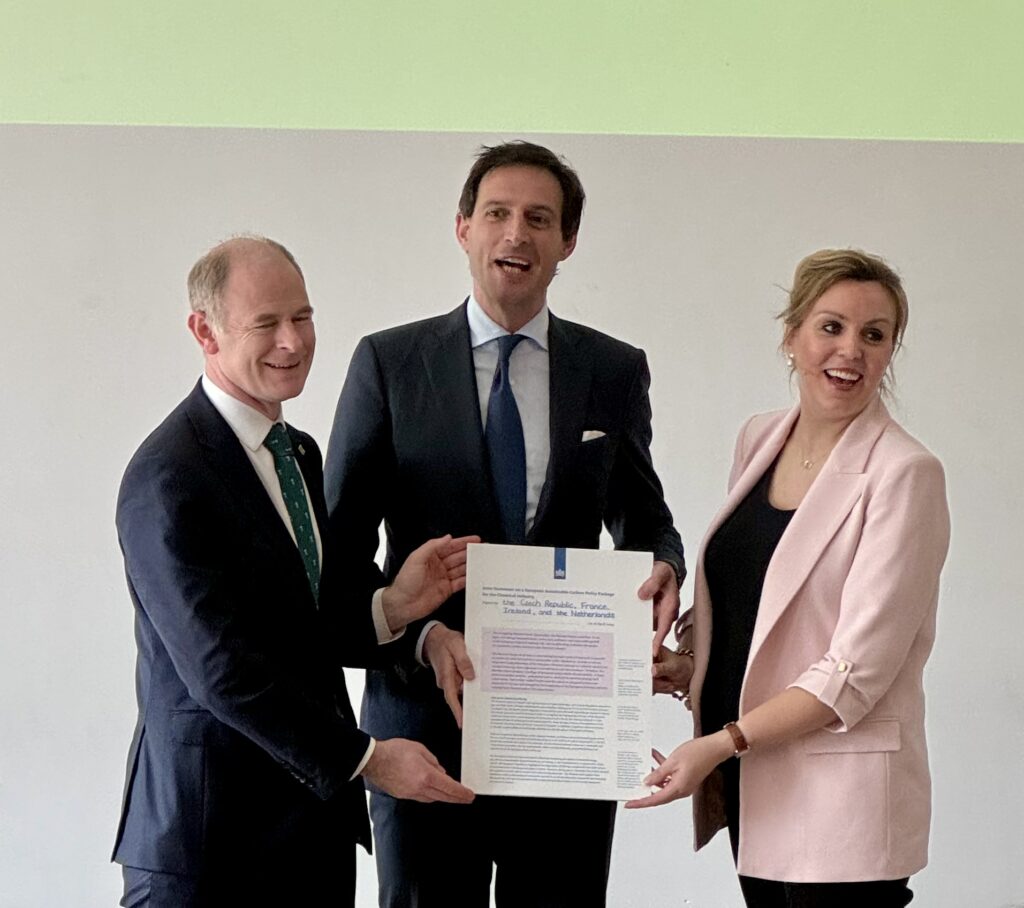
In order to take swift action at EU level to transform the chemical industry into a sustainable sector, the Dutch government worked on a joint statement together with Member States France, the Czech Republic and Ireland. This statement was presented for the first time to the Commission and Member States, as well as industry representatives, on 16 April 2024 and handed over to the European Commission, represented here by European Commissioner for Climate Action Wopke Hoekstra, who warmly welcomed the initiative. It was the first time ever that European politicians presented a paper on the defossilisation of the chemical industry and asked the Commission for strong action and a long-term vision.
Industry associations have been calling for years to overcome the lack of a level playing field between the energy and fuel sectors, where the transition away from fossil fuels is strongly supported by various instruments such as quotas, and the chemicals and materials sector, where there are no comparable incentives at all. The concept of defossilisation was first introduced by the Renewable Carbon Initiative in 2020 to replace the fossil carbon embedded in chemicals and materials with biomass, CO2 and recycled materials.
It was no less than a long-awaited milestone for several initiatives and associations in the chemicals and materials sector when Ms Hejinen delivered the following message: “In our statement we propose that an overarching European policy framework is needed in order to achieve the transition from fossil to sustainable carbon feedstocks in the chemical sector. Such a framework is essential if we’re to ensure the long-term competitiveness of the European chemical industry, while at the same time transforming it into a truly sustainable industry.”
The chemical industry can and should become a driving force in achieving both the EU’s circularity and climate goals, all while also reducing our dependence on foreign actors. That means it must not only look at reducing emissions from its own processes, but also at using alternative feedstock sources than the largely dominating fossils. Currently, the feedstock of the European chemical industry is covered more than 90% by fossil feedstocks, which accumulates to around 10% of the EU’s total fossil resource consumption. That is a significant chunk for just one sector, and targeted action here can have a huge impact on our overall fossil use. If the chemical industry is to become a sustainable and competitive leader, sustainable carbon – such as recycled materials, sustainable biomass and CO2 – must replace fossil-based carbon. The Joint Statement now emphasises the need to effectively promote the use of sustainable carbon sources in the chemical industry.
But how do we make the transition to a competitive, circular and climate-neutral chemical industry?
Vivianne Hejinen presents a clear strategy: “We, the initiators of this joint statement, are convinced that we need an overarching European policy framework. An EU policy package that focuses on market creation, sustainable carbon availability and instruments to strengthen the competitiveness of the chemical industry.
First of all, market creation is essential to boost demand for and supply of sustainable carbon products. Effective incentives that take into account all three sustainable carbon sources – recycled materials, sustainable biomass and CO2 – can drive this market. For instance, achievable, gradually increasing and ambitious targets can be set to promote the use of sustainable carbon as a feedstock in the chemical industry. In doing so, the EU is enabling a strong and sustainable chemical sector to flourish in Europe.
Besides market creation, careful attention needs to be paid to the availability of sustainable carbon to help companies transition to these sources. To maximise availability, the member states are calling for a sustainable carbon availability strategy, in line with the Waste Framework Directive and the EU bioeconomy strategy.”
After Vivianne Heijnen’s speech, Katja Wodjereck, Executive Vice President Renewable Products at Neste (Finland), and Marco Mensink, Director General of Cefic, joined for a high-level panel discussion. Both fully and strongly supported the Joint Statement of the four Member States.
Mr Mensink pointed out the ongoing, absurd situation that there are strong incentives for burning biomass for electricity and heat, for using biomass or CO2 for fuels, or for capturing and storing CO2 long term – but the only activity that is completely ignored is the use of biomass or CO2 for products. This goes against cascading use principles and the circular economy, and Mr Mensink asked for a long term framework for a level playing field for chemicals and plastics using biomass, CO2 and recycled materials, for incentives and targets as for sustainable fuels.
Ms Wodjereck from Neste, which has already made a significant switch from fossil to renewable and recycled carbon, added the importance of creating market demand to the discussion. Such demand can start with small quotas, but she stressed that it has to start somehow. Twenty years ago, nobody expected that biofuels would ever reach significant shares. And today, in California, 50% of diesel is biodiesel. It takes a long-term vision to invest.
To sum up: A group of four EU Member States in the Netherlands, France, Ireland and the Czech Republic are proposing an overarching long-term European policy framework to achieve the transition from fossil to sustainable carbon feedstocks in the chemical industry. More supportive Member States are expected to join this proposal soon, is it provides a clear pathway without alternative to ensure the transition towards a modern and globally competitive chemical industry in Europe – which at the same time can also achieve sustainability and net-zero targets. The Joint Statement is a milestone and a significant opportunity to limit Europe’s external dependencies while moving closer to our European climate and environmental goals.

Full speech of Dutch Environment Minister Vivianne Heijnen:
Background information
Source
Renewable Carbon Initiative, original text, 2024-04-16.
Supplier
European Chemical Industry Council (CEFIC)
European Commission
European Union
Government of the Netherlands
Renewable Carbon Initiative (RCI)
Share
Renewable Carbon News – Daily Newsletter
Subscribe to our daily email newsletter – the world's leading newsletter on renewable materials and chemicals









